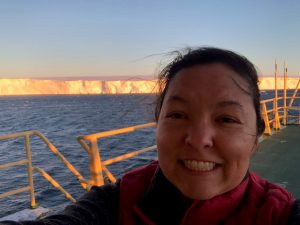
From the June 2019 Desktop News | When Victoria Fitzgerald arrived at UA to begin her PhD in January, she thought she would spend most of her time studying the Jurassic Period eolian rock formations of Alabama, extending her master’s program research. She thought most of her time would be spent in the Center for Sedimentary Basin Studies in Tuscaloosa or at the state geological survey, able to drive home to her family in no time.
She never thought she would end up in Antarctica.
Fitzgerald, a geology PhD student and one of the university’s National Science Foundation Graduate Research Fellows, travelled to Antarctica with her advisor, UA assistant professor Dr. Rebecca (Totten) Minzoni, to assist on the International Thwaites Glacier Collaboration (ITGC) Thwaites Offshore Research team, to better understand the risks and recent history of rapidly changing Thwaites glacier, better known to non-scientists as the Doomsday Glacier.
“Our goal isn’t to tell people the world is filled with doom and gloom,” Fitzgerald said. “Our goal is to figure out the timeline. As the glaciers melt, we’re going to have global sea level rise. We know that, but we don’t fully understand how it is changing and the rate at which it is responding to changes, especially in the last 10,000 years. We’re studying sediment to develop better models and account for variables that we haven’t yet.”
Fitzgerald and Minzoni are part of a team of ITGC researchers funded by the U.S. National Science Foundation and the UK Natural Environment Research Council. Dr. Minzoni is a co-Investigator for THOR and served as the lead sedimentologist during their research cruise aboard the Nathaniel B. Palmer this spring. Fitzgerald’s role onboard was to help sample mud collected from the ocean floor, to reconstruct the behavior of the glacier through the analyses of meltwater samples, microfossils, grain size, and other proxies. These data will help researchers learn more about the Florida-sized glacier.
“There are 27 sediment cores from this cruise, and I can’t focus on all of them for my PhD,” Fitzgerald said. “I’m focusing on the most recent change at the glacier front, which is actually several kilometers further inland than it was two or three years ago. We were the first people ever to be that close to the ice front.”
While working to break barriers in her academic field, Fitzgerald is also breaking barriers in her personal life. When she began her undergraduate career, she planned to go into the military. However, in her last few years, she discovered a love for geological research while assisting one of her professors in sorting through data collected in Nicaragua.
“I had a work study program with a volcanologist,” Fitzgerald said. “We were looking at Nicaraguan lake sediments. I wasn’t a part of the fieldwork, but I got to see the aftermath— lake core samples that needed analyses and hunting for shells and other things to carbon date. I really liked figuring out the why and the how things happen…and seeing the behind-the-scenes of science discovery.”
After graduating, Fitzgerald continued with her plans to join the military and had a successful career in the Army. But when the time came for her to leave, she knew she had to return to academia. Fitzgerald began her master’s degree in geology at Kansas State University, where she became a National Science Foundation Graduate Fellow. Once her master’s was defended, Fitzgerald and her family made the move to UA, where she is now a PhD student.
Both a first-generation and non-traditional student, Fitzgerald, who is also a mother of three young girls, has learned to navigate college in a new way. She works hard in the lab, and makes sure that she spends time with her kids, which, she says, isn’t always easy to balance.
Although her path may be different than most, Fitzgerald hopes to inspire others who may be considering the non-traditional path to pursue their goals.